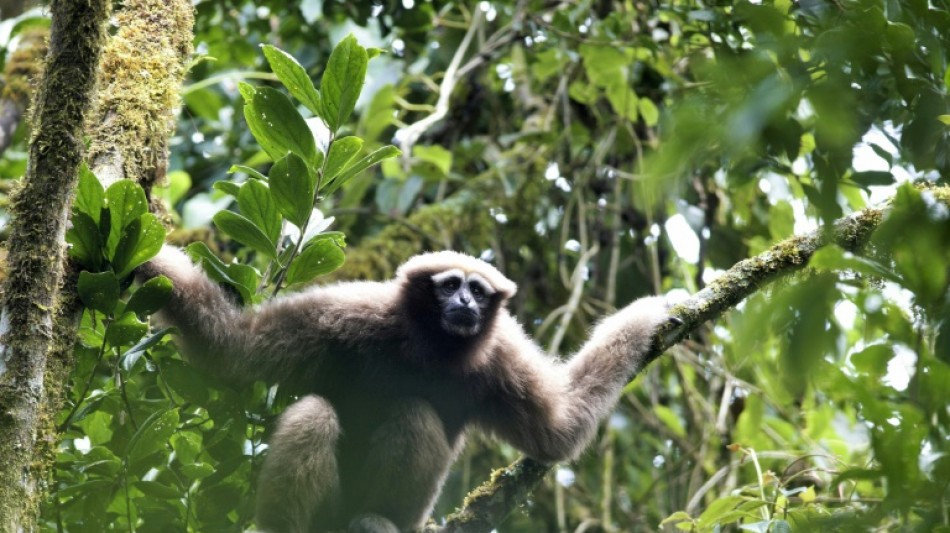
-
 US Republicans begin push to hold Clintons in contempt over Epstein
US Republicans begin push to hold Clintons in contempt over Epstein
-
Trump says agreed 'framework' for US deal over Greenland

-
 Algeria's Zidane and Belghali banned over Nigeria AFCON scuffle
Algeria's Zidane and Belghali banned over Nigeria AFCON scuffle
-
Iran says 3,117 killed during protests, activists fear 'far higher' toll

-
 Atletico frustrated in Champions League draw at Galatasaray
Atletico frustrated in Champions League draw at Galatasaray
-
Israel says struck Syria-Lebanon border crossings used by Hezbollah

-
 Snapchat settles to avoid social media addiction trial
Snapchat settles to avoid social media addiction trial
-
'Extreme cold': Winter storm forecast to slam huge expanse of US

-
 Jonathan Anderson reimagines aristocrats in second Dior Homme collection
Jonathan Anderson reimagines aristocrats in second Dior Homme collection
-
Former England rugby captain George to retire in 2027

-
 Israel launches wave of fresh strikes on Lebanon
Israel launches wave of fresh strikes on Lebanon
-
Ubisoft unveils details of big restructuring bet

-
 Abhishek fireworks help India beat New Zealand in T20 opener
Abhishek fireworks help India beat New Zealand in T20 opener
-
Huge lines, laughs and gasps as Trump lectures Davos elite

-
 Trump rules out 'force' against Greenland but demands talks
Trump rules out 'force' against Greenland but demands talks
-
Stocks steadier as Trump rules out force to take Greenland

-
 World's oldest cave art discovered in Indonesia
World's oldest cave art discovered in Indonesia
-
US hip-hop label Def Jam launches China division in Chengdu

-
 Dispersed Winter Olympics sites 'have added complexity': Coventry
Dispersed Winter Olympics sites 'have added complexity': Coventry
-
Man City players to refund fans after Bodo/Glimt debacle

-
 France's Lactalis recalls baby formula over toxin
France's Lactalis recalls baby formula over toxin
-
Pakistan rescuers scour blaze site for dozens missing

-
 Keenan return to Irish squad boosts Farrell ahead of 6 Nations
Keenan return to Irish squad boosts Farrell ahead of 6 Nations
-
US Treasury chief accuses Fed chair of 'politicising' central bank

-
 Trump rules out force against Greenland but demands 'immediate' talks
Trump rules out force against Greenland but demands 'immediate' talks
-
Israeli strike kills three Gaza journalists including AFP freelancer

-
 US Congress targets Clintons in Epstein contempt fight
US Congress targets Clintons in Epstein contempt fight
-
Huge lines, laughs and gasps as Trump addresses Davos elites

-
 Trump at Davos demands 'immediate' Greenland talks but rules out force
Trump at Davos demands 'immediate' Greenland talks but rules out force
-
Australia pauses for victims of Bondi Beach shooting

-
 Prince Harry says tabloid coverage felt like 'full blown stalking'
Prince Harry says tabloid coverage felt like 'full blown stalking'
-
Galthie drops experienced trio for France's Six Nations opener

-
 Over 1,400 Indonesians leave Cambodian scam groups in five days: embassy
Over 1,400 Indonesians leave Cambodian scam groups in five days: embassy
-
ICC rejects Bangladesh's plea to play T20 World Cup matches outside India

-
 Prince Harry says UK tabloid court battle in 'public's interest'
Prince Harry says UK tabloid court battle in 'public's interest'
-
Trump lands in Davos to push Greenland claims

-
 Balkan wild rivers in steady decline: study
Balkan wild rivers in steady decline: study
-
Injured Capuozzo misses out on Italy Six Nations squad

-
 Mourners pay last respects to Italian icon Valentino
Mourners pay last respects to Italian icon Valentino
-
EU parliament refers Mercosur trade deal to bloc's top court

-
 Odermatt seeks first Kitzbuehel victory with eye on Olympics
Odermatt seeks first Kitzbuehel victory with eye on Olympics
-
Italy's Brignone to be rested for Spindleruv Mlyn giant slalom

-
 Alcaraz spearheads big names into Australian Open third round
Alcaraz spearheads big names into Australian Open third round
-
European stocks dip ahead of Trump's Davos speech

-
 Trump flies into Davos maelstrom over Greenland
Trump flies into Davos maelstrom over Greenland
-
EU won't ask Big Tech to pay for telecoms overhaul

-
 Railway safety questioned as Spain reels from twin train disasters
Railway safety questioned as Spain reels from twin train disasters
-
Marcell Jacobs back with coach who led him to Olympic gold

-
 Syria army enters Al-Hol camp holding relatives of jihadists: AFP
Syria army enters Al-Hol camp holding relatives of jihadists: AFP
-
Brook apologises, admits nightclub fracas 'not the right thing to do'


Finding Skywalker gibbons with love songs: study
Valentine's day is over but love's call lingers: the Skywalker gibbons' mating song, scientists reported this week, has revealed a previously unknown population -- the largest in the world -- of the endangered primate in the jungles of Myanmar.
When the Skywalker hoolock gibbon was first discovered in 2017 by a group of Star Wars-loving scientists, its only confirmed population -- less than 200 individuals -- was in neighbouring China's Yunnan Province.
But in a new study published in the International Journal of Primatology, researchers confirmed Myanmar has the largest known population of Skywalker gibbons in a single location.
"This is a significant discovery for the future of primate conservation in Myanmar," Ngwe Lwin, expedition leader and Fauna & Flora country director in Myanmar, said in a statement.
Gibbons do not swim, restricting them to the forest canopy's towering treetops.
This means broad rivers cutting through the jungle can dictate where the species settles.
Though no live Skywalker gibbons have been confirmed in Myanmar over the past century, a team of researchers from Myanmar, the United States, Britain and Germany followed a hunch based on geography that the primates might be found between two rivers in the southeast Asian nation.
Between December 2021 and March 2023, researchers set up acoustic monitoring systems in the hopes of detecting and recording the Skywalker's morning love songs to figure out their location.
Then, the team collected half-eaten plants and fruits favoured by the primates for genetic analysis.
When spotted, the researchers took photographs of Skywalker hoolock gibbons and compared them to other hoolock species, noting that Skywalkers have distinctively thinner eyebrows, a black or brown beard rather than a white one, and females have incomplete white face rings.
After determining viable habitat, analysing recordings and photographs, sequencing DNA and interviewing local wildlife and conservation organisations, the team had no doubts: Myanmar is home to 44 groups of Skywalker gibbons.
While the exact number of Skywalker gibbons in the new location is still unknown, a 2013 population estimate suggested that there could have been up to 65,000 gibbons in the area where Skywalkers were identified.
However, the current number of individuals could be lower due to the threats the primates face.
- Urgent need for protection -
Only four percent of habitat in Myanmar suitable for Skywalker gibbons is found in established protected areas.
Besides habitat loss, other threats the primates face include land fragmentation and degradation, accelerating deforestation, "bush meat" hunting, and the live trade in exotic animals.
More than 95 percent of the skywalker gibbon population in Myanmar exists outside of protected areas, and population decline is projected to continue, and possibly accelerate, according to the study.
Given these threats, the researchers recommended to the International Union for the Conservation of Nature (IUCN) that the species keep its "endangered" status despite the discovery of a new population.
"Now more than ever, it is recognised that the collective efforts of stakeholders, including governments, communities and Indigenous Peoples groups, are the only effective way to protect and save our closest living relatives," Ngwe Lwin said.
D.Schaer--VB




